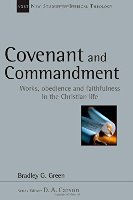Brad Green (Associate Professor of Christian Thought and Tradition at Union University and Review Editor for Systematic Theology here at Books At a Glance) has made the latest addition to the famous New Studies in Biblical Theology series edited by D.A. Carson. His Covenant and Commandment treats a question that is high on today’s list of theological inquiries, and his contribution gives helpful clarity to that discussion. The book is very well-informed and yet easily accessible for any theological reader. We are pleased to see it, and we are pleased today to talk with Dr. Green about his excellent work.
Books At a Glance (Fred Zaspel):
First, tell us what your book is all about. What is the question you are addressing?
Green:
 Hi Fred. As I began to read and develop as a theological student, I discovered and came to love the reality and magnificence of the grace of God. Grace is a beautiful thing, and rightly the grace of God elicits our awe, and should result in true praise of God. As one reads Scripture, including the New Testament, one keeps seeing that the works, obedience, and faithfulness of the believer are seen as expected, and in some since “necessary” (a key word here!). My key question was: how does one affirm (1) the radical grace of God as well as a Reformational and Protestant understanding of justification by faith apart from works, and affirm (2) what appears to be a clear biblical pattern of the necessity of works, obedience, and faithfulness in the life of the Christian.
Hi Fred. As I began to read and develop as a theological student, I discovered and came to love the reality and magnificence of the grace of God. Grace is a beautiful thing, and rightly the grace of God elicits our awe, and should result in true praise of God. As one reads Scripture, including the New Testament, one keeps seeing that the works, obedience, and faithfulness of the believer are seen as expected, and in some since “necessary” (a key word here!). My key question was: how does one affirm (1) the radical grace of God as well as a Reformational and Protestant understanding of justification by faith apart from works, and affirm (2) what appears to be a clear biblical pattern of the necessity of works, obedience, and faithfulness in the life of the Christian.
Books At a Glance:
In some respects, this is an old question, of course, but how is this a particularly contemporary question? Can you characterize the debate for us briefly?
Green:
Perhaps the best way to answer that question is as follows. As this issue began to intrigue me and exercise more and more of my thinking, one of the things I began to do was go back and read the dogmatic tradition (particularly within the Reformed tradition) on this issue. I still remember reading Turretin when he asks, “Are good works necessary for salvation?” His answer: “We affirm.” Turretin goes on to say very carefully and precisely what the issue is. He writes: “Are they [i.e., good works] required as the means and way for possessing salvation?” His answer?: “This we hold.” As I read others—whether Calvin or Shedd or Hodge or Dabney—I kept finding the same basic notion: somehow good works are a constitutive part of the life of the Christian.
Now, I have written my book, but there is another book to be written. It would concern how this or that intellectual tradition develops and changes over time. One thing that can happen is that a tradition can deem that more and more perspectives or construals are out of bounds—the tradition can “narrow.” This can be a good and necessary thing. It can be unnecessary and bad. Of course, a tradition can also become so broad that it becomes virtually meaningless and vacuous—the tradition can “broaden”. What intrigues me is why Turretin’s answer above would (likely?) strike many present-day Protestants as a tad counterintuitive.
At least for me, I suspected there was some work to do on thinking through what I thought I was seeing in the Scriptures (on the necessity of works, obedience, and faithfulness in the Christian life)—particularly in light of the Reformed theological tradition (i.e., Turretin) and its notion that works are somehow “the means and way of possessing salvation”.
Now to your question: this whole question matters because when see all of the passages which seem to speak of the necessity of works, obedience, and faithfulness (chapter 1 of my book), we might make one of two errors. We might (1) fail to relate such passages rightly to a biblical and Evangelical notion of salvation by grace (so we perhaps become legalists, and likely end up in despair), or (2) we gloss over such passages because they don’t “fit” what we think a biblical understanding of grace entails. I wanted to write a book which would help persons avoid both errors.
Books At a Glance:
You point out that this is a question that in important ways is tied to the discipline of Biblical Theology. Summarize for us how the perspective of the New Covenant compares and/or contrasts to that of the Old Covenant.
Green:
Good question. The nature and relation of the Old Covenant and the New Covenant is of course perhaps the question in Biblical Theology, or at least one of the key questions! I spend a good bit of time on this in the book—with particular attention to passages in Ezekiel and Jeremiah (particularly of course Jeremiah 31), and then of course various new covenant passages in the New Testament.
Besides my treatment of the Scriptures, I turn to a variety of theologians past and present as I work through the question of Old Covenant and New Covenant. I argue that we get into trouble if we simply associate Old Covenant with “works” and New Covenant with “grace.” Or to put it similarly: the Old Covenant with “doing something,” and the New Covenant with “not needing to do anything.” I think that basic approach gets one off on the wrong foot. It seems to me that God expects his people to obey him in both the Old Covenant and the New Covenant. So both Old Covenant and New Covenant have that in common. But I attempt to articulate what I think is “better” about the New Covenant. It is not better because God all of a sudden does not expect his people to obey Him. Rather, it is better (and this is a big question) at least in part because of a better sacrifice, a better priest, and that God’s Law is placed in the hearts of all covenant members—and I take covenant members to be all regenerate. Now, because God’s Law is placed in the heart of all covenant members (= regenerate persons), what God is doing in history is to work such that all persons in whom His Spirit dwell do obey Him (Ezekiel 36:26ff.).
Books At a Glance:
How does an understanding of inaugurated eschatology – the “now and not yet” – help us in this question?
Green:
Again, a great question. I think—as I state above—that all those persons in whom God places His Spirit will obey Him. But, since we live in this “already and not yet” time, this obedience will not be perfect or complete. It will be marked by fits and starts, egregious imperfection, etc. This is part of living life in this “already and not yet” era. Our lives as Christians will be marked by real, but imperfect obedience.
Books At a Glance:
Moving to Systematic Theology, what is the relation of faith and works and of justification and sanctification?
Green:
Again, great questions. Part of the burden of my book is to try and argue that sola fide should not be seen as somehow antithetical to Scriptural teaching on the necessity of works, obedience, and faithfulness. Rather, we should see that justification by faith apart from works should be seen as part of the grounds of a sound theology of works, obedience, and faithfulness (Henri Blocher argues something similar in his wonderful essay on sola fide in the Carson/O’Brien/ Seifred Justification and Variegated Nomism volume). I would argue that one should distinguish “faith” and “works”, but they are never ultimately completely inseparable in the life of the believer. That is, the one who has saving faith is the one in whose life works will be seen. I think we should affirm that justification is a declarative act, and that in justification God is one who does the justifying—He does the declaring that we are “just”. In sanctification it is necessary to see that in the New Testament we see both divine and human agency. It is a different dynamic than with justification. As John Owen can argue in length in Mortification—simply referencing Paul—it is we who put to death the deeds of the body, but we do it by the Holy Spirit (Romans 8:13).
Books At a Glance:
How would you characterize the role of works in the life of the Christian? In what respect are we to understand good works as “necessary”? Or, to put it more pastorally, how should a Christian view concepts such as obedience and faithfulness?
Green:
I think you can really lose your head on this one. As I did the reading and study for the book, it became more and clear that one of the things God is doing in history is forming a people who will love and honor and glorify Himself. From a different angle: God is forming and purifying a bride to be presented to the bridegroom. A part of this formation and work—a work which ultimately flows from the cross itself—is the transformation and shaping of a people who will know, love, honor, praise, and obey God.
Pastorally, I would avoid thinking in terms of a “works-ometer” or the like. God has prepared works for us to do (Ephesians 2:10), and Jesus died for us in order to redeem us, to purify us—a people zealous for good works (Titus 2:14). I think pastorally it is helpful to not simply say to people: “God saved you, you better do good works”. Rather, and this is why Biblical Theology, and pastoral ministry rich in biblical preaching and teaching is so important, it is necessary to frame the “necessity” of works, obedience, and faithfulness in light of the overarching story of Scripture, and in light of the fact of a fundamental mystery: While in one sense we work because it is God who works in us, it is also the case that it is truly we who work (Philippians 2:12-13).
Books At a Glance:
What will be the role of works for believers at the final judgment?
Green:
I argue in the books that works will play a role at the final judgment, but not that our works are meritorious. Again, all good theology makes careful distinctions! I argue that works are “necessary,” in that works—as Turretin says—are simply the “means and way of possessing salvation.” But—and this is central—I also argue that I need the perfect law-keeper who is judged in my place—Jesus Christ. Works are necessary, but I agree with Augustine that—ultimately—God “crowns his own gifts” in us. I also argue, in agreement with Calvin, that our works are in a sense also “justified by faith” because such works flow from the life of a person who is first and foremost justified by faith apart from works.
Editor’s Note: This from D.A. Carson’s Preface:
For the Christian, to know Jesus, to confess him as Lord, entails obeying him. But how does this reality relate to a plethora of complementary themes? Dr Green addresses this question by soundings in an impressive diversity of topics…. The canvas on which he paints is large enough to draw in a wide range of readers, all of whom will find themselves stimulated to think about these issues more precisely.
Buy the books

Covenant And Commandment: Works, Obedience, And Faithfulness In The Christian Life
